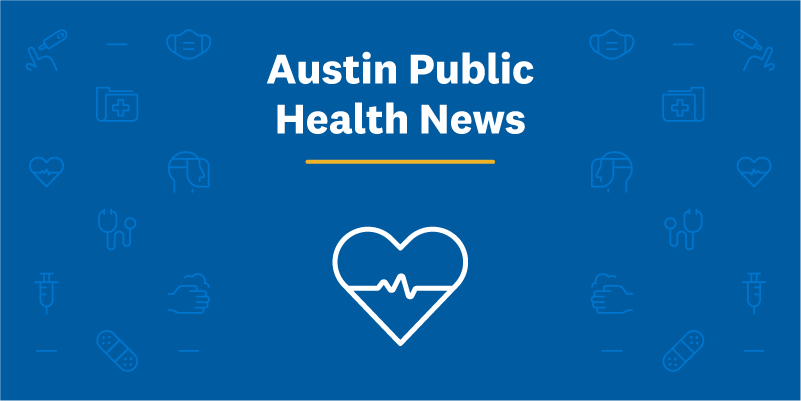
City of Austin
FOR IMMEDIATE RELEASERelease Date:
Contact: APH Media

Staying informed on signs of heart disease and cardiac arrest can save a life.
AUSTIN, Texas - February is American Heart Month, and Austin Public Health (APH) and Austin-Travis County EMS (ATCEMS) are taking this opportunity raise awareness of heart disease and cardiac arrest in our community.
Heart disease continues to be the leading cause of death across the U.S. Local data shows that:
- African Americans are disproportionately affected by heart disease, suffering the highest mortality rate.
- The prevalence of heart disease in Travis County has been on the rise over recent years.
- Adults of all race and ethnicity, especially those 65 and older, experience the highest rates of heart disease.
Medical conditions can lead to a higher risk of heart disease. High blood pressure, high cholesterol and diabetes can all increase your risk. These conditions aren’t always apparent with obvious symptoms – that's why it’s important to schedule regular screenings where doctors can determine your health status and offer solutions to prevent and manage your risk factors.
“At the start of the year, many of us are looking to make self-improvements, including being more active and eating better. I encourage everyone to stick with these resolutions as they can save your life,” said Austin-Travis County Health Authority Dr. Desmar Walkes. “Making these small changes of going for a walk every day and choosing healthier meal options will reduce your risk of heart disease.”
While some risk factors, such as age and family history, can’t be controlled, there are lifestyle choices and prevention methods that can lead to a healthier heart and lifestyle.
- Eating foods with high levels of salt, saturated fat and added sugar can lead to a higher risk of heart disease and other chronic diseases. Aim for a balanced diet rich in fruits, vegetables and whole grains. Small changes to your diet add up and can make a big difference in your health.
- Exercise and physical activity promote a healthier, stronger heart and can reduce a number of risk factors, including high blood pressure, high cholesterol, diabetes and obesity. Physical activity also has benefits like reducing stress, improving your sleep and boosting your mood.
- Smoking is linked to an increased risk of heart disease and heart attack, and it’s not just the smokers who are affected. Those who are exposed to secondhand smoke are also at risk for heart disease. The use of tobacco can also make exercise harder.
- Drinking too much alcohol can increase the risk of heart disease.
In severe cases, a heart attack can cause the victim to go into cardiac arrest, a life-threatening condition where the heart stops beating. When someone suffers a cardiac arrest, their chance of survival decreases by the second. Early CPR by trained bystanders can dramatically improve those odds and give patients the best possible chance of recovery. ATCEMS teaches CPR and First Aid classes at several certification levels, regularly. Those interested can learn more or register for classes on our website.
“Bystander CPR plays a critical role in the chain of survival, and we need the community’s help,” said ATCEMS Chief Medical Officer and EMS System Medical Director Mark Escott. “The rate of bystander CPR in Austin is below the national average, but American Heart Month is the perfect opportunity for community members to invest in our collective preparedness by learning CPR and what to do during an emergency. Together, we can make Austin healthier for everyone.”
Recognition of cardiac events plays a major role in the survivability of heart attacks. The earlier symptoms are recognized, and EMS is activated, the higher the likelihood of a positive outcome for those patients. Now is the time to review the signs and symptoms of these life-threatening conditions with your family and friends so you know how to help!
A heart attack occurs when blood flow to the heart is obstructed. Signs and Symptoms of a Heart Attack include:
- Chest pain or pressure.
- Pain or discomfort that spreads to the shoulder, arm, back, neck, or jaw.
- Cold sweats.
- Lightheadedness or sudden dizziness.
- Nausea.
- Shortness of breath.
Heart attacks are time-sensitive, life-threatening events. If you or someone you are with experiences any symptoms of these conditions, call 9-1-1 immediately. ATCEMS paramedics are experts in recognizing these conditions and can begin life-saving treatment the moment 9-1-1 is called.
You aren’t alone in your fight for a healthier heart. The following programs and resources are readily available in Austin-Travis County.
- Learn CPR with Austin-Travis County EMS.
- Fresh for Less Mobile Markets are run by Farmshare Austin and offer fresh, affordable fruits and vegetables via mobile markets and home deliveries.
- Austin Moves! Is a free 6-week program for adults that meets 2x a week to walk in groups.
- Ready to quit tobacco? Find resources to quit at Live Tobacco-Free Austin.
- APH offers free healthy lifestyle classes to the public.
- Health screenings are regularly offered at APH’s Neighborhood Centers.
- Additional information and resources can be found at healthyplaceshealthypeople.org.
